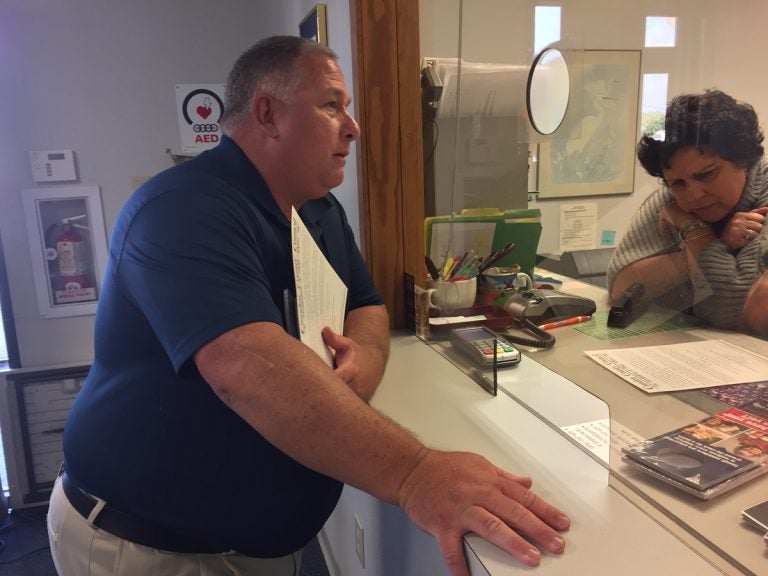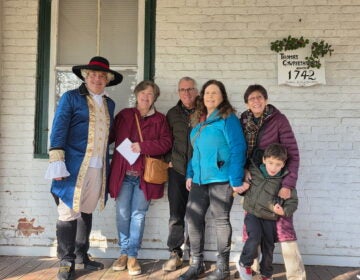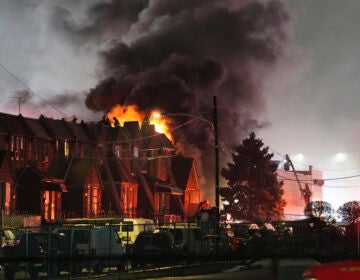Spreading the word about addiction, treatment at the street level in New Jersey
Bob Chew used to lock up drug addicts. But on Friday, the former Camden police sergeant was walking the streets, hoping to get them help.
Listen 0:00
Bob Chew hands out information on drug addiction and treatment for Knock Out Opioid Abuse Day, a statewide event in New Jersey. (Joe Hernandez/WHYY)
Bob Chew used to lock up drug addicts.
But on Friday, the former Camden police sergeant was walking the streets, hoping to get them help.
“Could you maybe help spread the message for us?” he said to one man walking along Broadway in Gloucester City, a 2-square-mile town just below Camden.
Chew was taking part in Knock Out Opioid Abuse Day, a statewide event organized by the nonprofit Partnership for a Drug-Free New Jersey.
Volunteers fanned out across the Garden State to hand out pamphlets and door hangers with information on opioid addiction and drug treatment, part of a larger strategy to fight the opioid crisis in the state. They targeted passers-by, police departments, doctors’ offices, and anybody else who would stop and listen.
Gov. Chris Christie has made combating drug abuse a marquee issue of his final year in office, tightening the prescription rules on doctors and allocating extra state funding for treatment programs. This week the administration announced nearly $3 million in grants for recovery high schools, meant to help teenagers battling substance abuse.
On Thursday, state Attorney General Christopher Porrino joined other states in suing Insys Therapeutics, Inc., a pharmaceutical company that produces opioids, claiming that “the conduct alleged in our lawsuit is nothing short of evil.”
Knock Out Opioid Abuse Day aimed to attack the opioid epidemic through education, banking on the theory that some people in the throes of addiction might simply need a little assistance to see the path to recovery.
“We are here to help. It’s not just about locking somebody up,” said Capt. Mike Morrell, an 18-year veteran of the police department of Gloucester City, which is batting back the flow of opioids alongside Camden, Newark and other larger urban centers.
Even though the town of 11,000 people is small and tightly knit, Morrell said, at least one person overdoses there every week or so.
“People are traveling to Camden [or] Philadelphia, and they’re obtaining their opioids. And, a lot of times, they end up coming back into town here, and might pull over to the side of the road or use one of our hotel parking lots,” he said.
(Gloucester City police officers now carry naloxone, a drug that can reverse an overdose.)
James Burkhardt, who stopped to chat on Friday, said “half the people I know” in Gloucester City are addicted to drugs. “Second to Camden,” Burkhardt said of the seriousness of the problem there. “And Camden’s pretty damn bad.”
It is an epidemic, officials say, that touches more corners of society than previous drug crises that have occurred — largely in cities — in this country.
Chew, now a program coordinator at the nonprofit Camden County Council on Alcoholism and Drug Abuse, said decades in the police force taught him that arresting drug users does not help them shake their addiction or improve their lives.
When he isn’t giving talks on the issue, Chew is spreading the word at the street level, hoping the information on addiction he offers finds its way to someone who needs it.
“Unless you have someone in your family that’s telling you about it, a friend giving you education about it and doing everything they can to prevent it,” Chew said, “it’s gonna continue on.”
The Associated Press contributed to this report.
WHYY is your source for fact-based, in-depth journalism and information. As a nonprofit organization, we rely on financial support from readers like you. Please give today.




